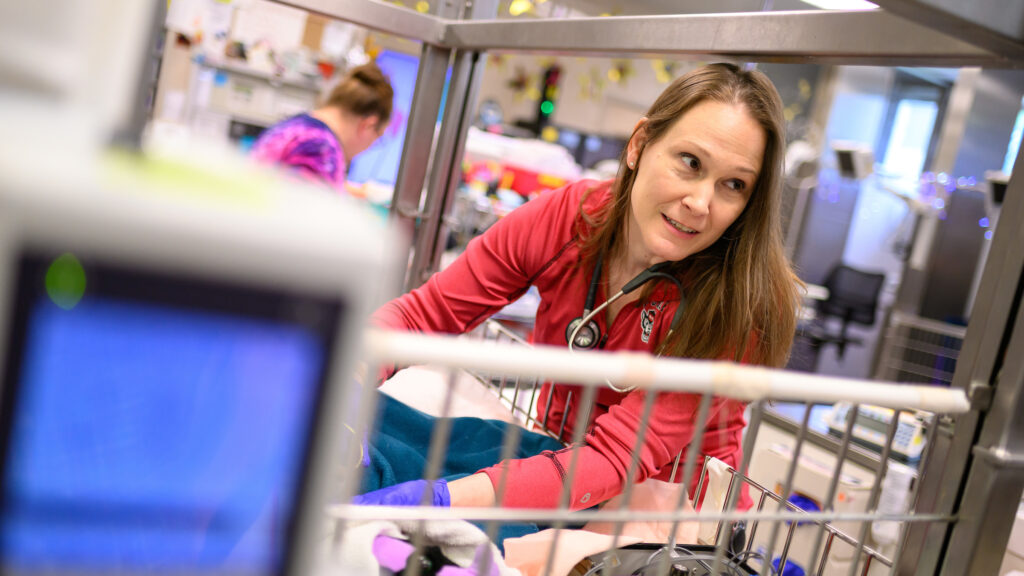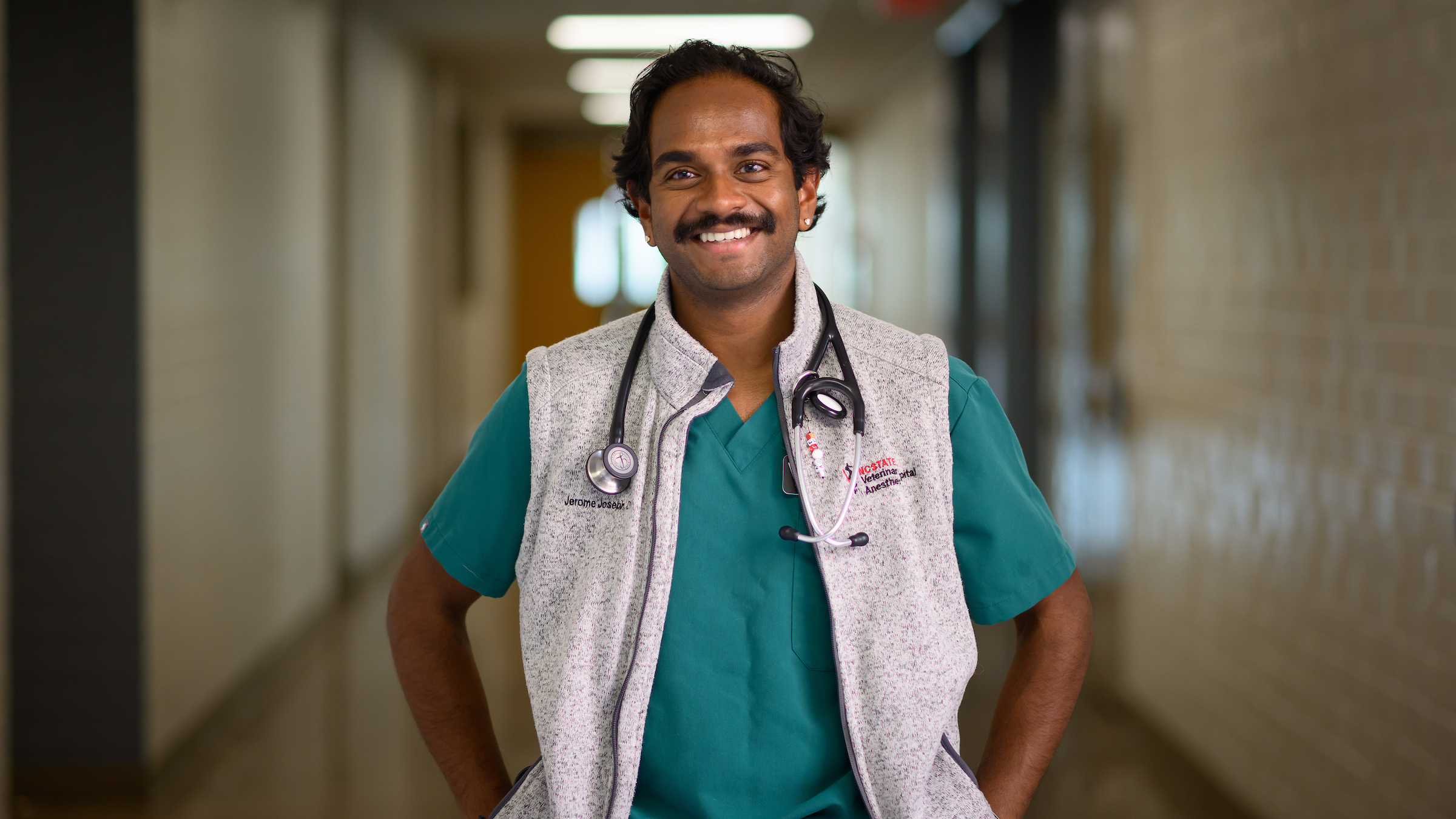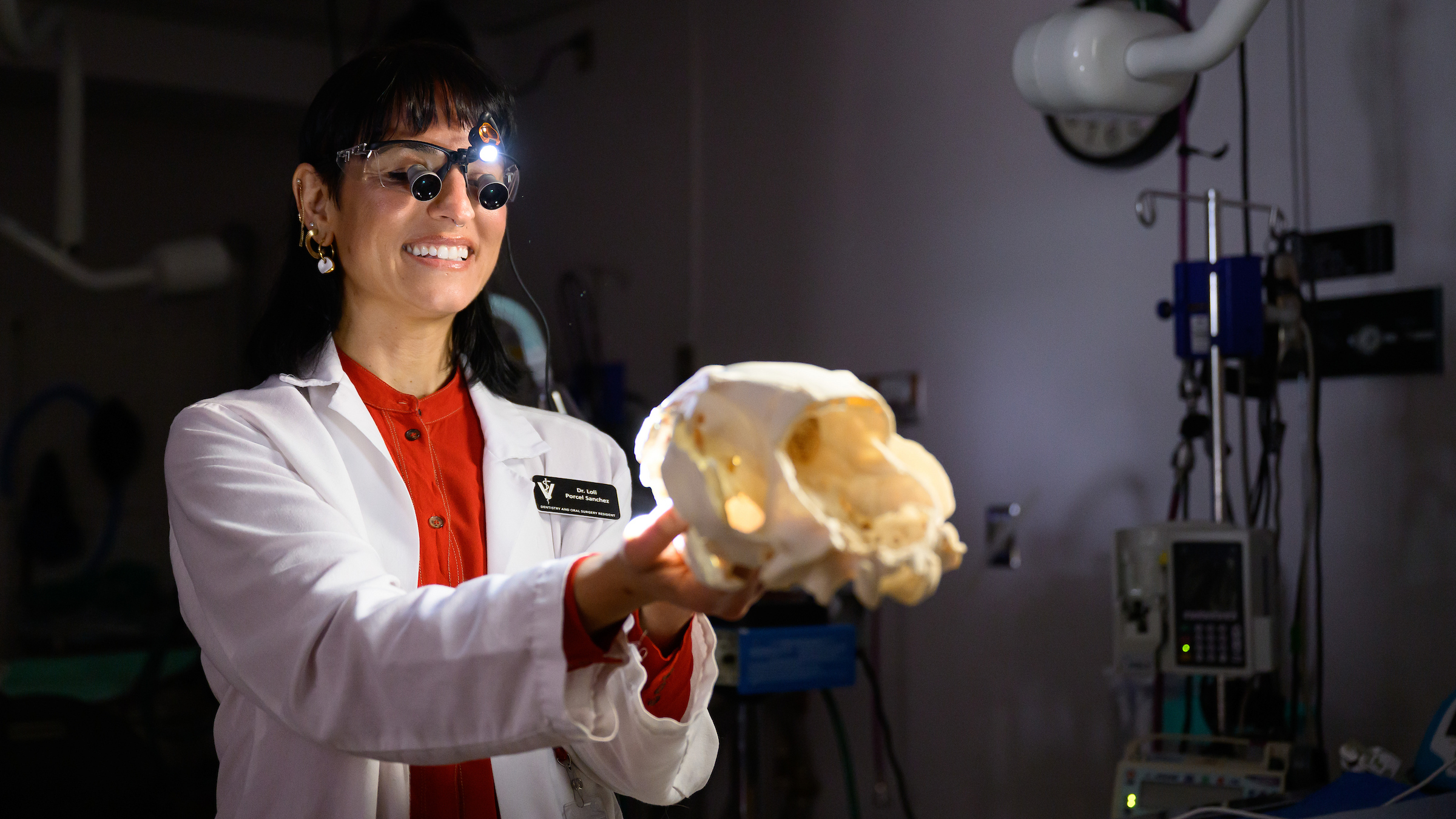House Officer Highlight: Army Veterinarian Sees Animals at Their Worst to Help Them Feel Their Best
Dr. Candace Wimbish, an Army major and third-year emergency and critical care resident at the NC State Veterinary Hospital, keeps a cool head while providing life-saving care to beloved pets.
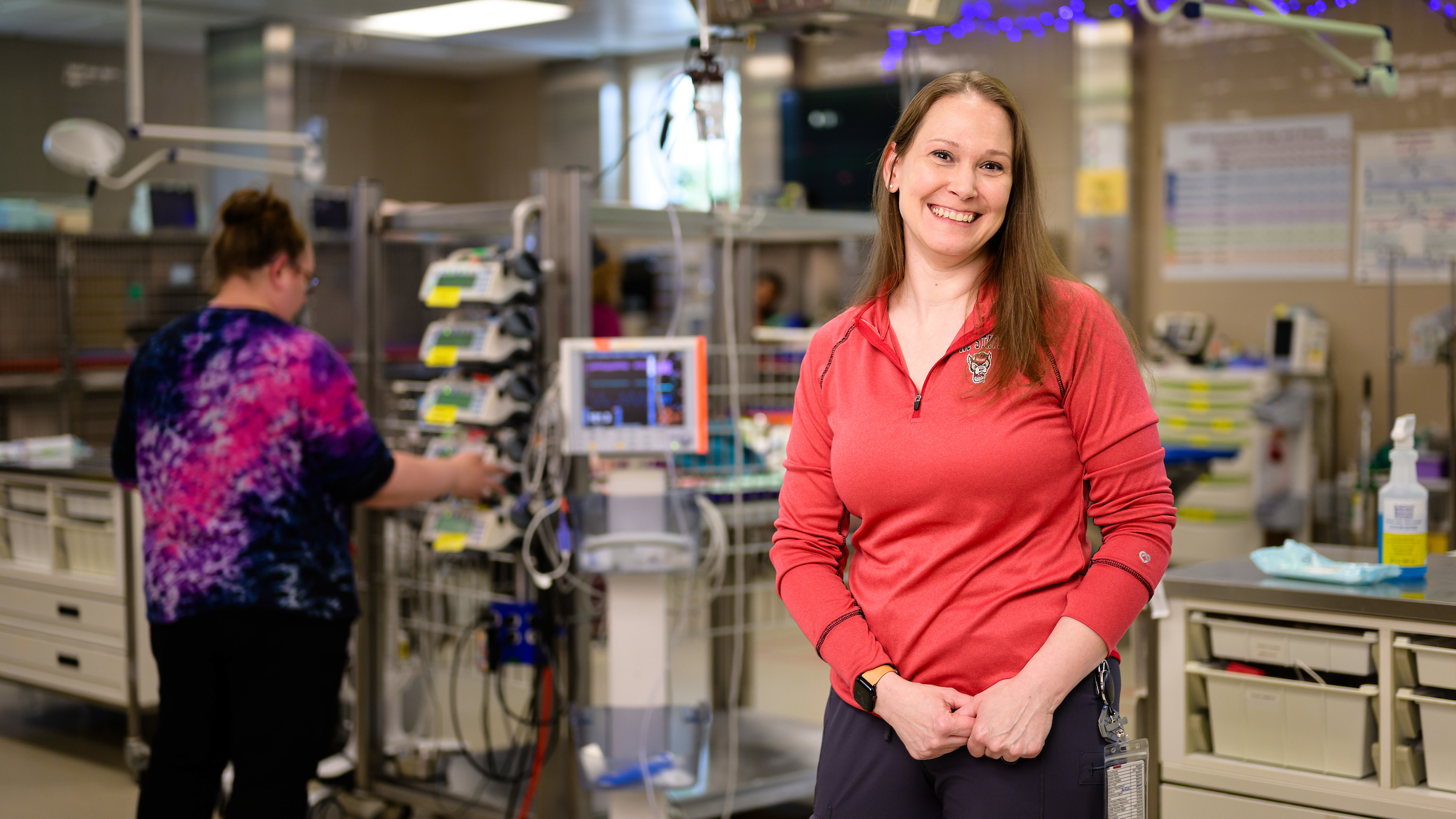
House officers at the NC State College of Veterinary Medicine dedicate themselves to saving lives and improving animal health at our Veterinary Hospital, touching the hearts of our human community in the process.
A house officer is a veterinarian who has earned a DVM or equivalent degree and works in a specialized clinical training role that is comparable to that of a human medical intern or resident.
Like at a human hospital, there are three types of house officers at the Veterinary Hospital: interns, or trainees with a one-year appointment; residents, longer-term trainees whose terms vary by medical specialty but typically last about three years; and fellows, post-residency veterinarians who pursue specialized training of various lengths.
“Residents and interns are the primary clinicians in charge of every patient that comes through the hospital,” says Erin Lempp, house officer coordinator. “They act as the liaison between the client and the presiding senior faculty member who’s more behind the scenes. Not only that, but their other big role involves teaching and mentoring the fourth-year students doing their clinical rotations in that service.”
Unlike human physicians, veterinarians are not required to complete an internship or residency to practice medicine. Many house officers take on the additional training to gain expertise in a specific area of veterinary medicine and become board-certified in that specialty.
With 10 internship programs, 26 residency specializations and three fellowship programs, NC State’s house officer training program is one of the largest in the world.
“Our facility is amazing,” Lempp says. “We have incredible faculty mentors, and the resources and professional development opportunities we’re able to provide our house officers are unparalleled. Plus, our connections to human medical resources in the Research Triangle lead to collaborations between human and veterinary specialists that offer unique learning opportunities.”
This year, 119 house officers have formed the backbone of the NC State Veterinary Hospital’s innovative, patient-centered care. Follow our House Officer Highlight series to meet some of these outstanding veterinarians and learn about their essential work.
Meet Dr. Candace Wimbish
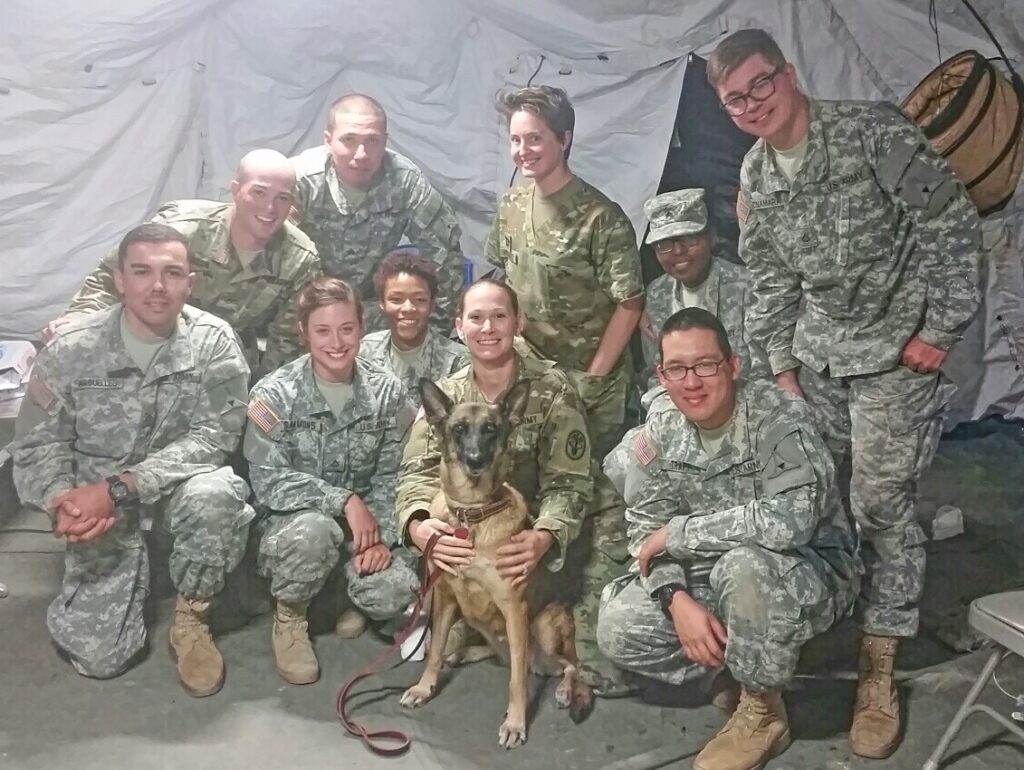
When Dr. Candace Wimbish sees someone in need, she jumps into the fray.
Her drive to help others, plus a self-professed tendency to be an adrenaline junkie, is what led her to become an Army veterinarian specializing in emergency medicine and to seek advanced training via a small animal emergency and critical care residency at the NC State College of Veterinary Medicine.
At NC State, Wimbish is both trainer and trainee. She draws on the two decades of veterinary experience she earned prior to her residency while she saves animal lives and teaches DVM students and fellow residents at the Animal Hospital. At the same time, her position challenges her to “know more and do better.”
“I’ve always loved emergency medicine, and I knew there were things that I could offer to my patients that I was not familiar or comfortable with yet,” says Wimbish, 42, of why she pursued a residency. “NC State was the correct program for my interests and for the Army, since the university is so military-friendly.”
Called to Service
Wimbish’s love of animals started while she was growing up on a farm in College Station, Texas. A member of the Choctaw Nation of Oklahoma, Wimbish started working as a receptionist at a veterinary hospital in Carrollton, Texas, straight out of high school.
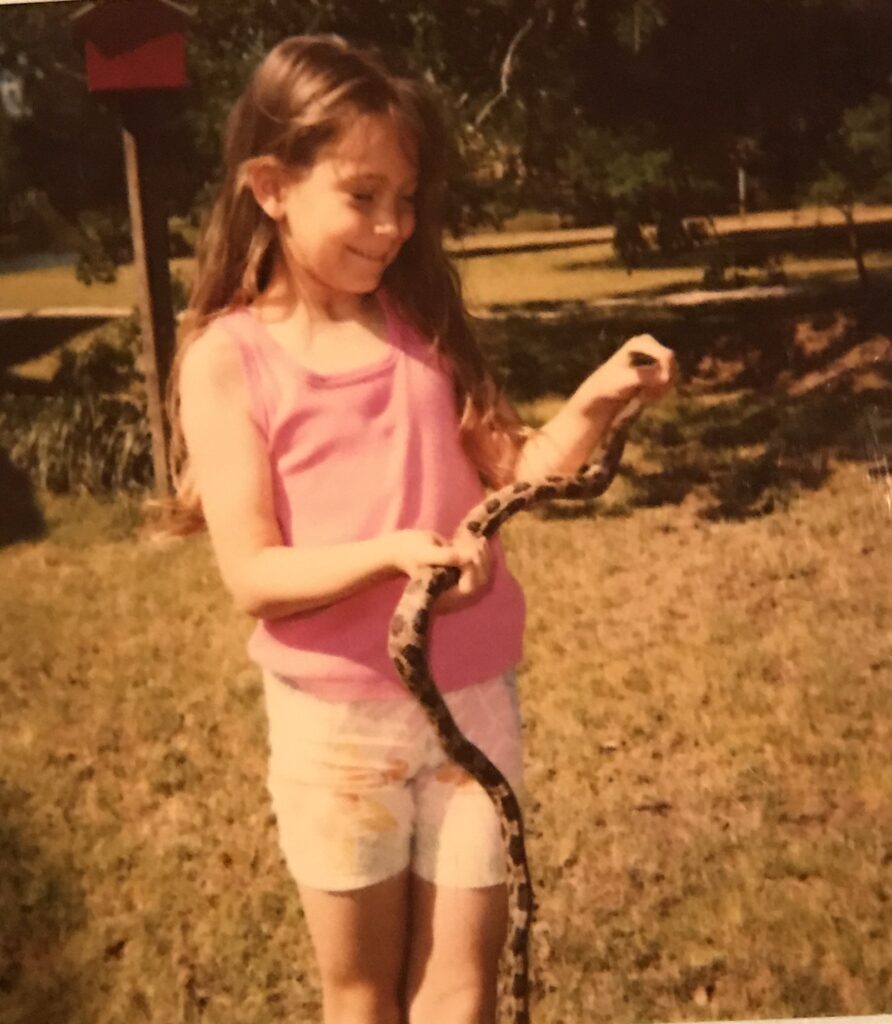
Realizing she found where she belonged, she earned her veterinary technician license and worked as an LVT for about 10 years, primarily in emergency, specialty and shelter medicine.
In the mid-2000s, the opportunity to work with a wildlife rehabilitation program took her to Seattle, Washington, where a chance discovery during a fireworks show changed her career path.
Wimbish has a family background in military service and wanted to serve but did not see a way to combine that with veterinary medicine. One Fourth of July at the Naval Station Everett, she and her now-husband, a Navy veteran, sought shelter from biting winds behind a building and the building started barking.
“I looked over, saw they were military working dog kennels and thought, ‘If they have working dogs, they have veterinarians,’” says Wimbish. “I was back in Texas the first of August to complete my bachelor’s degree so I could become a military veterinarian.”
Wimbish started in community college and transferred to the University of Texas at Arlington, where she balanced her biochemistry studies with enlistment in the Texas State Guard and Army ROTC. In 2008, she deployed to southern Texas with the Guard to run a shelter for pets evacuated from Hurricanes Gustav and Ike.
She attended veterinary school at Oklahoma State University and earned a place in the Army’s Health Professions Scholarship Program, which provides full-tuition scholarships and a stipend to eligible students in exchange for a commitment to serve in the U.S. Army Veterinary Corps.
Wimbish graduated with her DVM in 2014 after completing externships at the Animal Welfare Shelter in Tulsa, Oklahoma, and at the Fort Wainwright Army base in Fairbanks, Alaska. The Army sent her to Fort Cavazos in Texas for her internship, at her request.
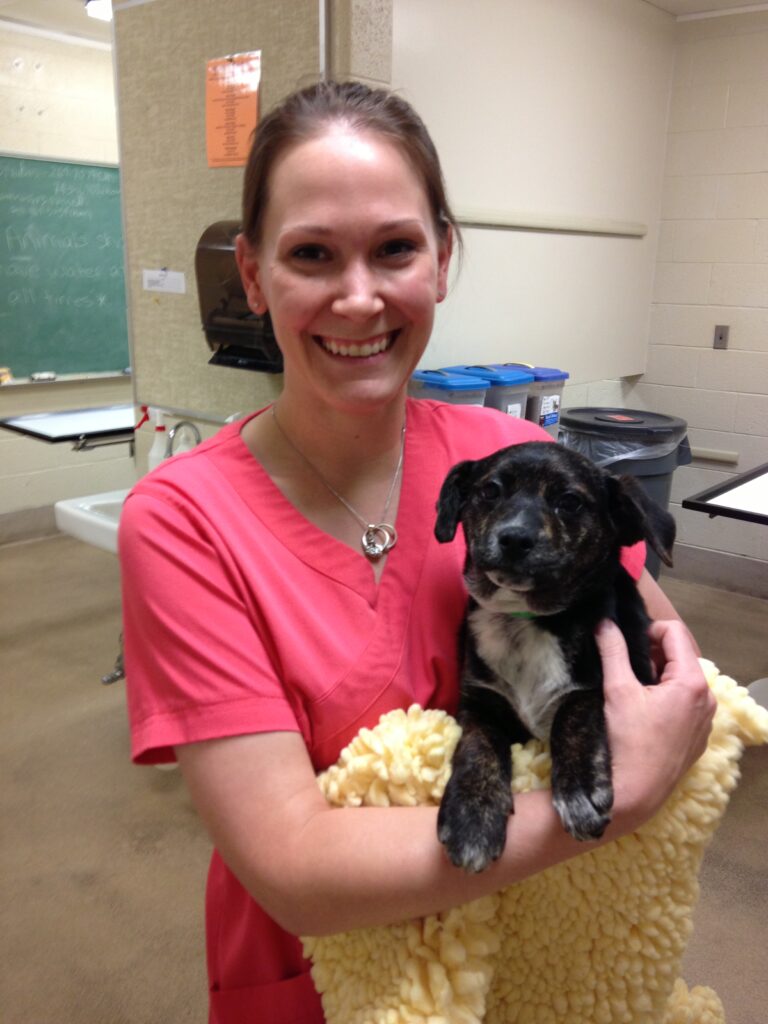
“They had cavalry horses, and most installations don’t have an equine mission,” Wimbish says. “They also had a shelter animal facility at the time and, of course, offered clinical services for military working dogs and the pets of service members. Our training had a threefold mission: clinical medicine, leadership and public health.”
After Wimbish’s internship, the Army sent her to the Marine Corps Air Ground Combat Center in Twentynine Palms, California, where she cared for Marine working dogs preparing for deployment to Afghanistan. She also helped with a pack mule training course in Northern California, teaching Marines how to work with the animals in preparation for deployment in remote areas inaccessible by foot or vehicle.
During that assignment, Wimbish’s veterinary experience and call to serve others also led her to save a human life.
Wimbish was driving on a desert stretch of highway north of Joshua Tree National Park in March 2018 when she watched the tow truck in front of her hit a motorcycle, ejecting the biker a dozen feet from his vehicle.
Wimbish pulled over, jumped out of her car and quickly placed tourniquets on the man’s limbs, stanching his bleeding until paramedics could arrive.
“It’s just what anybody would do if they needed to,” says Wimbish, who still keeps in touch with her impromptu patient. “He was terribly injured; it’s amazing he survived. His dogs would usually ride in the cargo bucket of his motorcycle, but they weren’t with him that day, and so he felt that it was just fitting that a veterinarian saved him.”
After three years in California, Wimbish was moved to Fort Liberty in Fayetteville to serve with a civil affairs unit for three years. There, she helped set up a trap-neuter-return program in a Middle Eastern nation to train the country’s veterinary students in surgical skills and small animal medicine. She also volunteered with the Cumberland County Animal Shelter.
Wimbish knew she wanted to do a residency when that assignment ended. She applied to the Army’s version of the match program with critical care as her specialization, and once she was selected the Army let her choose where to go.
“I wanted a facility that had blood-banking capabilities, extracorporeal therapy and a strong track record for producing exceptional criticalists,” she says. “And when I interviewed at NC State, everyone here was so welcoming.”
‘A Life-Changing Opportunity’ at NC State
The leadership skills Wimbish learned in the military come in handy in the Veterinary Hospital, where she works closely with care teams to triage anything and everything that comes through the ICU’s doors. Her Army training also helps her keep a cool head in even the most stressful scenarios.
“I’m the first active duty emergency and critical care military resident NC State has ever taken,” Wimbish says. “A lot of times, military veterinarians’ clinical backgrounds are very different from our civilian counterparts, but from Day One I’ve just been part of the team.”
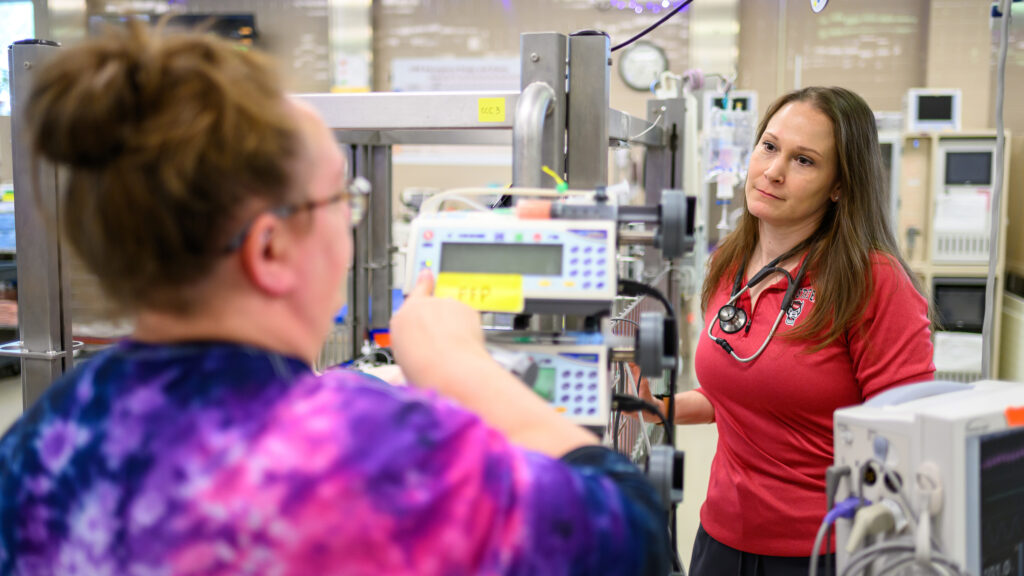
In return, NC State has expanded Wimbish’s emergency medicine knowledge base and skill set. She now feels more confident guiding teams of junior veterinarians after teaching fourth-year DVM students and other residents.
But some things never change: Wimbish admits her favorite patients to work with at the Veterinary Hospital are still military working dogs.
“We’ve treated some dogs from Fort Liberty, from the military police force and the special forces group,” she says. “I love getting to tie both parts of my life together with those patients.”
After her residency ends in July, Wimbish will take her emergency and critical care board exam in September and then report to her next Army assignment in Fort Campbell, Kentucky.
That three-year assignment on a deployable unit will have Wimbish working side-by-side with Army human physicians to set up field hospitals for service members and military K-9s injured abroad. While stateside, she will work with federal and state agencies on supporting disaster response and K-9 missions.
Wimbish is confident that her training in the NC State Veterinary Hospital’s ICU has equipped her to handle whatever situations she’ll see in the field.
“It’s been an incredible experience and literally a life-changing opportunity — not to sound cliche, but it’s true,” she says.
